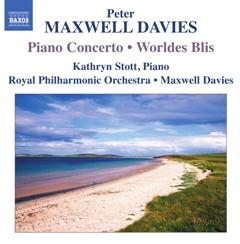Peter Maxwell Davies - Piano Concerto; Worldes Blis (2013)
Peter Maxwell Davies - Piano Concerto; Worldes Blis (2013)

Piano Concerto (1997) (36:02) 1 I - Moderato - Più Mosso - Andante - Più Mosso - Andante 17:22 2 II - Adagio - 8:35 3 III - Allegro 10:04 Worldes Blis (1966-69) (42:23) 4 Lento Recitando - Lentissimo 18:50 5 L' Istesso Tempo - 4:31 6 Allegro - 3:30 7 Poco Più Mosso - 6:19 8 Allegro - 1:46 9 Lento 7:27 Kathryn Scott – piano The Royal Philharmonic Orchestra Peter Maxwell Davies – conductor
As with most releases in the Naxos series on Maxwell Davies, these recordings were previously issued on Collins Classics, Worldes Blis in 1993 and the Piano Concerto in 1998. On the back cover CD insert, there Read more The Sunday Telegraph to proclaim the concerto as “one of the most attractive and immediately likeable piano concertos to appear for some time.” Although I liked it, I would never make such a claim. This piece, though not as astringent or cerebral as some of Maxwell Davies’s music, is far from “immediately likeable.” It sounds, rather, like Prokofiev swathed in the harmonies of Berio or, at times, Ligeti, which makes it interesting but certainly not immediately appealing to the average listener. Crushed brass chords underscore the piano’s often atonal tinkling, and even attempts at producing melodic themes challenge the listener with their atonal or bitonal harmonic clashes. Again, the liner notes belie what one actually hears, describing “the tense ‘Scots-snap’ rhythms” and “A vivacious dance.” If you can dance to this stuff, you must have three legs and be hardwired in your brain for shifting cross-rhythms. Again, this is not a criticism of the music, which I found to be extremely interesting and among Maxwell Davies’s best works, but it is a very challenging piece with almost foreboding harmonies, and to pretend otherwise is to deceive the potential listener.
Since the concerto was dedicated to pianist Kathryn Stott, who plays it here, it is almost a foregone conclusion that her playing would be quite fine, and it is. I found her to be more of a cerebral rather than an emotional player, at least from this recording, and thus I’d have to say that the music suits her perfectly. Maxwell Davies appears to have assigned the most emotional passages to the orchestra, which keeps up an almost unbroken undercurrent of unease and menace, while the piano soloist merely overlays her commentary on this canvas. As a result I found this piece to be much more in line with Bartók’s Music for Strings, Percussion, and Celesta despite the very different melodic and harmonic style. The middle-movement Adagio , which is ironically the briefest of the three movements, presents the listener with a moment of relative inertia—the music barely, almost imperceptibly, nudges forward—but not of any calm or comfort. (Oddly enough, the use of pizzicato bass lines under the piano here almost, but not quite, put it in the realm of Third Stream music.) The third movement returns us to the unease of the first.
Worldes Blis, written in 1966-69, is based on a 13th-century plainchant yet is entirely instrumental. Here, Maxwell Davies’s flirtation with the kind of sound world being created by Ligeti is all the more obvious; even the use of a harp keeps the textures in the low range for much of the piece, and it seems to me to be more concerned with texture than anything else, though the slowly rising melody that begins in a solo cello is in some ways more melodic than anything in the concerto. Much of Worldes Blis has the same kind of rhythmic stasis and aura of unease that one hears in the middle movement of the piano concerto. It is, however, an interesting experiment in sound textures and suspension of time, so to speak, and it works very well. Slowly, almost imperceptibly at first, the music becomes busier, yet these “ Allegro s” will never be confused with a Mahler scherzo or a Prokofiev symphonic finale. As the music becomes busier, it also becomes denser both harmonically and rhythmically, pulling the listener along but not quite engaging one except to admire the cleverness of his construction. In brief, an interesting contribution to the growing Maxwell Davies collection. If only Naxos would do the same for the music of Nancy Van de Vate! ---FANFARE: Lynn René Bayley, arkivmusic.com
download (mp3 @320 kbs):
Zmieniony (Środa, 07 Czerwiec 2017 14:49)








